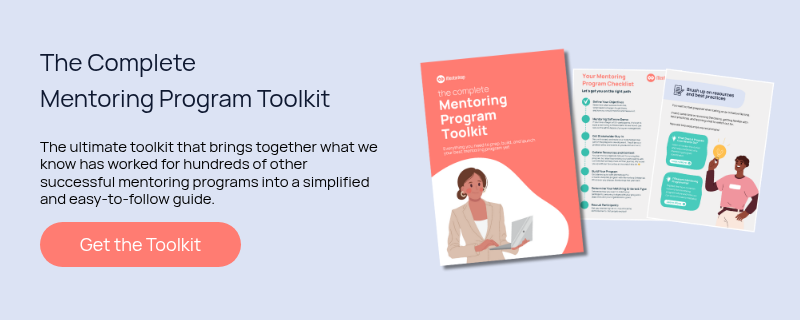For the first time in history, all four generations are in the workplace at the same time. As we experience better health and a higher cost of living, many older workers find themselves continuing in the workforce past what was once considered the traditional retirement age. This results in a lot of workplaces now having an intergenerational workforce.
Unfortunately, they may not always work well together. In today’s rapidly evolving world, the generation gap has become a prevalent issue. With each passing era, new technologies, values, and perspectives emerge, often creating a disconnect between different age groups. To address this problem, organizations and communities are turning to innovative solutions such as cross-generational peer mentoring programs. These programs serve as a bridge, connecting individuals from different generations and providing them with valuable opportunities to learn, grow, and connect.
In this post, we’ll explore what that type of mentoring program might look like at your organisation, as well as how it can help bridge the generation gap in order to foster more understanding between your workforce.
Let’s get to it!
What is a Cross-Generational Peer Mentoring Program?
A cross-generational peer mentoring program brings together individuals from different age groups and encourages them to engage in mentorship relationships. Unlike traditional mentorship programs where the older generation guides the younger one, cross-generational mentoring promotes mutual learning and knowledge exchange between peers. This unique approach acknowledges that wisdom exists across all generations and that everyone can benefit from the experiences and insights of others.
A cross-generational mentoring program typically pairs participants based on their interests, skills, and goals. Through regular meetings and interactions, mentoring partners build meaningful relationships, share knowledge, and provide support to one another.
Imagine a workplace where generations collaborate seamlessly, sharing knowledge and experiences to foster growth and development. A cross-generational peer mentoring program creates such an environment, breaking down the barriers between different age groups and promoting a sense of community and a culture of learning and innovation.
Benefits of Establishing a Cross-Generational Peer Mentoring Program
Gaining Broader Perspectives
One of the key benefits of a cross-generational peer mentoring program is the opportunity for participants to gain a broader perspective on life and work. When individuals from different age groups come together, they bring with them a wealth of experiences, perspectives, and insights. This diversity of thought and knowledge can lead to innovative problem-solving, creative thinking, and a more well-rounded understanding of various issues.
For example, imagine a cross-generational mentoring pair consisting of a millennial and a baby boomer mentor. The millennial may bring a fresh perspective on technology and social media, while the baby boomer can offer wisdom and experience in navigating corporate environments. By exchanging ideas and learning from each other, both individuals can enhance their skills and broaden their understanding of the world.
Breaking Down Stereotypes
Cross-generational peer mentoring programs can help break down stereotypes and bridge the generation gap. In today’s society, there can be misunderstandings and misperceptions between different age groups. Through personal interactions and shared experiences, mentoring partners can challenge preconceived notions and develop a more nuanced understanding of each other’s perspectives. This can lead to a more inclusive and harmonious environment, where individuals of all generations feel valued and understood and everyone can build meaningful connections based on trust and respect.
Enhancing Workplace Cohesion and Productivity
By fostering connections between colleagues of different generations, communication and collaboration within organizations improve significantly. In challenging age-related stereotypes and prejudices, individuals will find them easier to overcome, creating a more inclusive and harmonious, and therefore more productive, work environment.
Personal and Professional Learning and Development
Cross-generational mentoring programs can have a positive impact on personal and professional development as they offer tremendous learning opportunities for everyone involved. Individuals can benefit from the guidance and support of their peer mentors, who can provide valuable insights and advice based on their own experiences. At the same time, they can also develop their leadership and coaching skills by guiding and empowering their mentoring partner. More seasoned peer mentors can provide guidance on career choices, offer networking opportunities, and share valuable industry insights. This mentorship can significantly enhance their mentoring partner’s chances of success and help them navigate the challenges of their chosen paths.
Job Satisfaction and Retention
Mentees who are engaged in mentoring relationships are more likely to feel supported and valued by their organization, leading to higher job satisfaction and commitment. Mentors, on the other hand, experience a sense of fulfilment and purpose as they pass on their knowledge and expertise to the next generation of professionals.
Succession Planning and Leadership Development
As experienced employees engage with younger colleagues, they pass on their knowledge and skills, preparing the next generation of leaders within the organization. This ensures a smoother transition of leadership and helps maintain continuity in organizational vision and values.
Developing Meaningful Relationships
In a cross-generational mentoring program, mentors and mentees have the opportunity to develop meaningful relationships that extend beyond the workplace. These connections can lead to lifelong friendships and professional networks that span generations. Mentoring partners can serve as role models and accountability partners, and provide guidance not only in career-related matters but also in personal development and life skills.
Fostering Innovation and Creativity
Cross-generational mentoring programs can foster innovation and creativity within organizations. By bringing together individuals with different perspectives and experiences, these programs encourage the exchange of ideas and the generation of new solutions to complex problems. The combination of fresh perspectives and seasoned wisdom can lead to breakthrough innovations and strategic insights that drive organizational success.
Overall, a cross-generational peer mentoring program offers a unique and valuable opportunity for individuals from different age groups to come together, learn from each other, and grow both personally and professionally. By fostering mutual learning, respect, and understanding, these programs contribute to the development of a more inclusive and collaborative society.
How Does It Work?
Here are some ways in which that type of dynamic can be explored:
Technological vs Manual Methods
Whereas younger employees can further familiarise the older generation with tools that can help them work faster and smarter, older employees can show younger ones what they probably shouldn’t use tech for. After all, sometimes there are things that are still better done by humans (or at the very least, double-checked by one).
Industry Knowledge vs Industry Trends
There are simply some secrets of the trade that only the vets know; thankfully, they can share them with younger employees through a cross-generational peer mentoring program. On the other hand, younger team members can keep their older colleagues up to date on the newest emerging trends. This sharing of different types of expertise can make the knowledge base in your organisation stronger and more well-rounded as a whole.
Work Ethics and Work-Life Balance
This is an increasingly important conversation to have amongst colleagues, as work ethics and work-life balance might mean different things to each generation.
For example, Boomers are famously ready to work overtime (paid or otherwise) as they believe that going the extra mile is very important. On the other hand, Millennials and Gen Z believe that overtime must not be commonplace and if needed, must be paid. That’s because their priorities lie in areas of their lives other than work, including mental health, wellness, and a more equitable work-life balance.
The latter is a key issue that relates to employee happiness, and, as we’ve discussed before, happier employees are more productive employees, which also leads to better retention.
Additionally, while more mature folks might be averse to proactively asking for growth opportunities, their younger colleagues might believe these things should be a priority. Keeping this dialogue open can help team members of different generations better understand one another, which brings us to our next point…
Foster More Understanding Between Your Workforce
When people can start to gather an understanding of how others work and their general outlook in life, and meet them where they are, there’s less friction overall. This can help you make leaps and bounds as you work to create a more harmonious workforce.
How Cross-Generational Mentoring Can Help Bridge the Generation Gap
The generation gap is often fueled by misunderstandings and miscommunications between different age groups. However, a cross-generational mentoring program provides a platform for open dialogue and understanding. Through meaningful conversations, mentors and mentees can ask questions, address concerns, and clarify misconceptions that may arise due to generational differences.
Connecting Different Generations Through Peer Mentoring
Peer mentoring, as a framework, has proven to be effective in connecting individuals and creating strong bonds. When implemented across generations, it provides a unique opportunity for diverse groups to share knowledge, skills, and experiences.
Cross-generational peer mentoring allows individuals to connect and collaborate beyond their usual social circles, expanding their networks and fostering new friendships. By breaking down barriers and promoting intergenerational relationships, these programs cultivate an environment of support, acceptance, and growth.
Combating Ageism Through Cross-Generational Peer Mentoring
Ageism, the discrimination or prejudice against individuals based on their age, is a prevalent issue in today’s society. To combat this problem, cross-generational mentoring programs play a vital role in challenging stereotypes and biases.
By promoting positive intergenerational interactions, these programs highlight the value of individuals at any age. This approach breaks the traditional hierarchy and encourages mutual respect and appreciation. Through mentorship, participants celebrate diversity and recognize that each generation brings unique strengths and contributions to the table.
How to Create an Age-Inclusive Mentoring Program
Establishing an age-inclusive mentoring program requires careful planning and consideration. Here are some strategies to create a successful cross-generational mentoring program:
- Define the program’s goals and objectives, ensuring they align with the organization’s mission and values.
- Recruit mentors and mentees from various generations, taking into account their diverse backgrounds, skills, and experiences.
- Provide comprehensive training and resources to mentors to equip them with the necessary tools to support their mentees effectively.
- Create a structured mentoring framework, including regular check-ins, goal-setting, and evaluation processes.
- Encourage participants to share their knowledge and experiences through workshops, seminars, or mentoring circles.
- Foster a culture of respect, inclusivity, and open communication to ensure a positive mentoring experience for all participants.
- Continuously evaluate and adapt the program based on feedback and evolving needs.
Strategies for Crafting a Successful Cross-Generational Peer Mentoring Program
Building a successful cross-generational mentoring program requires careful consideration of various factors. Here are some strategies to craft an effective program:
- Create a supportive environment that encourages open conversation and collaboration between generations.
- Provide opportunities for mentorship beyond the workplace, such as community outreach or social events.
- Offer incentives and recognition for mentors and mentees to acknowledge their contributions and commitment.
- Maintain transparency and accountability by clearly communicating expectations, goals, and milestones.
- Encourage mentors and mentees to learn from one another by sharing stories, books, articles, or relevant resources.
- Promote inclusivity by ensuring access and participation for individuals from diverse socioeconomic backgrounds.
- Regularly assess the program’s impact and effectiveness through surveys, interviews, or focus groups.
By implementing these strategies, organizations can establish cross-generational mentoring programs that maximize the benefits for all participants, bridge the generation gap, and create a stronger, more cohesive environment for all.
The Final Word
Cross-generational peer mentoring programs are a powerful tool that can bridge the generation gap in your organization by helping you increase knowledge sharing in your organisation and improve culture. By connecting individuals from different age groups, these programs foster understanding, build meaningful relationships, and challenge stereotypes. Through empathy, respect, and shared knowledge, we can create a more inclusive and interconnected world, where generations learn from and support one another.
Ready to learn how Mentorloop can help your team with a cross-generational peer mentoring program? Start building your program by clicking the link below or reaching out to one of our mentoring experts.





